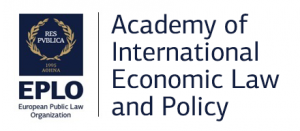Structure Courses
The EPLO LLM in IEL benefits from a core curriculum composed by intensive courses, together with seminars, workshops and events.
The core curriculum comprises the following modules, sub-divided into different subjects:
- I. Foundational Courses in International Economic Law
a. Fundamentals of Public International Law
b. International Economics
c. Money and the External Sector of the Economy
d. International Financial Institutions
e. Foundations of the International Regulation of Investment
f. Foundations of the International Regulation of Trade
g. Foundations of the International Regulation of Competition
h. Treaty Interpretation in International Economic Law
- II. International Trade: Theory and Practice
a. The Politics of Trade
b. The World Trade Organization (WTO) Institutions and Decision-making
c. Trade in Goods
d. Sanitary and Phytosanitary Measures (SPS) & Technical Barriers to Trade (TBT)
e. Customs Valuation and Trade Facilitation
f. Rules of Origin
g. Trade-Related Aspects of Intellectual Property Rights (TRIPS)
h. Government Procurement
i. Trade in Services
j. WTO Dispute Settlement (the Panel Process)
k. WTO Dispute Settlement (the Appeal)
l. Trade in Agriculture
m. Subsidies and Countervailing Duties
n. Trade Remedies
o. WTO Jurisprudence and Legal Advocacy
p. WTO Jurisprudence on Public International Law
q. WTO Dispute Settlement Clinic
r. Trade and Development
s. Trade and Environment
t. Trade in Energy
u. Industrial Policy and the WTO
v. China and the WTO
w. EU Regional Trade Agreements
x. Regionalism in the Americas, Asia and Africa
y. Legal foundations to Negotiate Trade Agreements
z. The Eurasian Economic Union III. International Investment
a. Key Issues in International Investment Agreements
b. ICSID and Non-ICSID Investment Arbitration
c. Jurisdiction and Admissibility in Investment Arbitration
d. Jurisdiction Ratione Materiae & Ratione Temporis
e. Jurisdiction Ratione Personae
f. Substantive Standards of Investment Protection I

- III. International Investment – ( continuation )
g. Substantive Standards of Investment Protection II
h. Investment Disputes Practice
i. Remedies in Investment Arbitration
j. Enforcement of Investment Arbitral Awards
k. Advanced Seminar on Investment Law I
l. Advanced Seminar on Investment Law II
m. Business &Human Rights
n. EU Law &Investment Law
o. Investment in Energy
p. State Owned Enterprises (SOEs) IV. Competition Law and Policy
a. Competition Economics
b. Competition Law – Cartels
c. Competition Law – Mergers & Acquisitions
d. Competition Law – Abuse of dominance
e. Competition Law & Technology
f. Procedural Competition Law
g. Private Enforcement of Competition Law
h. Competition and Data Protection
i. EU Institutions, Sources and Decision-making
j. Judicial Remedies in the European Union
k. The European Union Internal Market
l. EU State Aid Law
m. The Collaborative EconomyV. Other courses
a. Seminar on Public Speaking
b. Skills Seminar
c. Simulation of Trade Negotiations and Diplomacy
d. Final Review
e. EPLO LL.M. in IEL Moot Court
f. Law Clinic
g. Final Research Paper
All courses are compulsory to full-time students.
Given the dense program curriculum, these courses are classified between graded and non-graded courses.
Graded courses aim at evaluating students on core skills that are instrumental to the labor market. For each graded course students are exposed to a double system of evaluation: a short exam at the end of each course and a take-home exam.
Non-graded courses and activities provide soft skills and enriched contents for the students to be competent in different areas of IEL.
Students must also complete a Final Research Paper to be supervised and graded by a qualified scholar or a professional in the field.
